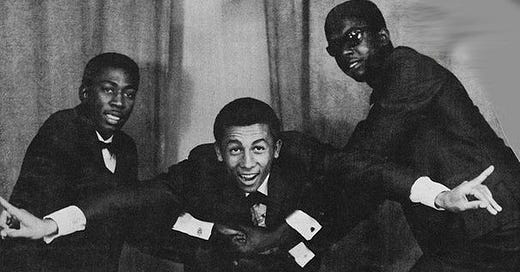Here’s the link to Part 1 of this series: Young Bob Marley: 1945-1962. The story continues where Part 1 left off:
While none of Bob Marley’s first released singles on Beverley Records became hits, they were spun on Jamaican jukeboxes. This alone was enough to encourage him to continue pursuing a full-time career in music. “Music was all he was interested in,” his mother wrote. “Music was his main thing.”
In a Melody Maker interview, Bob explained his next move: “My greatest influence at the time was the Drifters – ‘Magic Moment,’ ‘Please Stay,’ those things. So I figured I should get a group together.” Marley, Peter Tosh, and Bunny Livingston continued practicing together. They eventually added three more singers – Beverly Kelso, Cherry Green, and Junior Braithwaite. At first they called themselves the Teenagers, then the Wailing Rudeboys and the Wailing Wailers. (Cherry Green, a.k.a. Ermine Bramwell, would be ushered out of the group before their first recording sessions.)
In 1962 Cedella Marley’s sister Ivy invited her to live with her in Wilmington, Delaware. To Cedella, this was too good an opportunity to pass up. As described in her memoir, she saw America as “a land of wealth and plenty where all was prosperous and flourishing. My Jamaican eyes were dazzled by the sights of its richness.” She brought Bob’s half-sister Pearl to Wilmington, and married a Jamaican man there named Edward Booker. Bob, meanwhile, stayed behind in Trench Town with the Livingstons. No stranger to hunger and poverty, he persevered in his pursuit of a career in music. His scrappy, streetwise attitude led to his being nicknamed “Tuff Gong.”
In one of his letters to his mother, Bob expressed the spiritual solace he found in music and enclosed a U.S. $10 bill. In her memoir, Cedella revealed that Bob’s letter said “when he sang, he felt the spirit moving him just as it moved me in church, with the same joy and lightness in his soul. He wrote that the music business in Jamaica was still hard, but said that lately he got a little money and he wanted to put some if it in my hands, even though he knew it wasn’t much.” His generosity caused her to cry.
Joe Higgs introduced Bob, Junior, and Peter to his friend Alvin “Seeco” Patterson. A masterful Rastafarian percussionist, Seeco took them under his wing and helped them sharpen their rhythm. Seeco, who during the Island Records era would play percussion with the Wailers, introduced the trio in late 1963 to one of the top men in the Jamaican music industry: producer, DJ, and sound system man Clement Seymour “Coxsone” Dodd.
Since the late 1950s, Dodd had successfully produced, manufactured, and distributed singles by Alton Ellis, Delroy Wilson, Joe Higgs, Theophilus Beckford, the Maytals, and other local musicians. These releases were featured on his sound system and played on the radio. A savvy promoter, Dodd assembled his artists into revues that toured the island. His youthful prowess as a cricket player had led to people calling him “Sir Coxsone,” a nickname derived from the surname of one of his favorite athletes.
Keep reading with a 7-day free trial
Subscribe to Talking Guitar ★ Jas Obrecht's Music Magazine to keep reading this post and get 7 days of free access to the full post archives.



